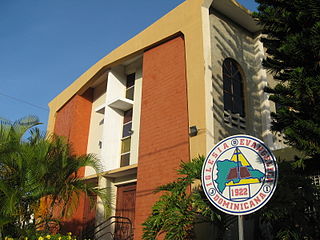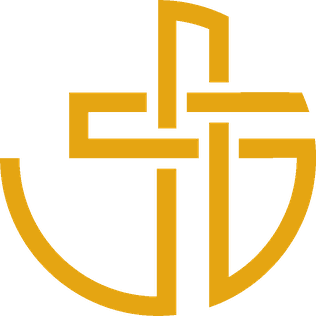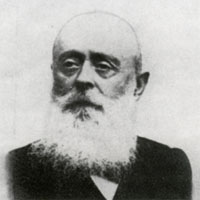Related Research Articles

The Waldensians, also known as Waldenses, Vallenses, Valdesi, or Vaudois, are adherents of a church tradition that began as an ascetic movement within Western Christianity before the Reformation. Originally known as the Poor of Lyon in the late twelfth century, the movement spread to the Cottian Alps in what is today France and Italy. The founding of the Waldensians is attributed to Peter Waldo, a wealthy merchant who gave away his property around 1173, preaching apostolic poverty as the way to perfection.

A united church, also called a uniting church, is a denomination formed from the merger or other form of church union of two or more different Protestant Christian denominations, a number of which come from separate and distinct denominational orientations or traditions. Multi-denominationalism, or a multi-denominational church or organization, is a congregation or organization that is affiliated with two or more Christian denominations, whether they be part of the same tradition or from separate and distinct traditions.

Protestant denominations arrived in the Philippines in 1898, after the United States took control of the Philippines from Spain, first with United States Army chaplains and then within months civilian missionaries.

The Evangelical Church of the Dominican Republic is one of the largest Protestant denominations in the Dominican Republic with approximately 10,000 members in 55 congregations.

Religion in Italy has been historically characterised by the dominance of the Catholic Church, the largest branch of Christianity, since the East–West Schism. This is in part due to the importance of Rome in the history of the Church, including its historical status as a leading patriarchate and the presence of the Vatican, the Catholic Church's headquarters and the residence of the Pope—the Bishop of Rome—within its borders. However, due to immigration, notably the influx of Muslims, Eastern Orthodox Christians, Protestants, Buddhists and Hindus, as well as proselytism and secularization, religious pluralism in Italy has increased in the 21st century. Italy also features a pre-Christian Jewish community, an autochthonous Protestant church–the Waldensian Evangelical Church and one of the largest shares of Jehovah's Witnesses in the world.

Christianity in Italy has been historically characterised by the dominance of the Catholic Church since the East–West Schism. However, the country is also home to significant Christian minorities, especially Orthodox Christians, Protestants and Jehovah's Witnesses.

The World Communion of Reformed Churches (WCRC) is the largest association of Reformed (Calvinist) churches in the world. It has 230 member denominations in 108 countries, together claiming an estimated 80 million people, thus being the fourth-largest Christian communion in the world after the Catholic Church, Eastern Orthodox Church, and the Anglican Communion. This ecumenical Christian body was formed in June 2010 by the union of the World Alliance of Reformed Churches (WARC) and the Reformed Ecumenical Council (REC).

The Waldensian Evangelical Church is a Protestant denomination active in Italy and Switzerland that was independent until it united with the Methodist Evangelical Church in Italy in the Union of Methodist and Waldensian Churches. Founded in the 12th century by Peter Waldo as a proto-Protestant group, since the 16th century Reformation it has adopted Calvinist theology and blended into the wider Calvinist tradition. It is one of several Protestant denominations with pre-Reformation roots, and is appraised by various denominations of Protestantism as its major successor.
The Union of Methodist and Waldensian Churches is an Italian united Protestant denomination.
The Federation of Evangelical Churches in Italy is an ecumenical Protestant body in Italy.

The Communion of Protestant Churches in Europe is a fellowship of over 100 Protestant churches which have signed the Leuenberg Agreement. Together they strive for realizing church communion, especially by cooperation in witness and service to the world. Prior to 2003 the CPCE was known as the "Leuenberg Church Fellowship".

The United Church of Christ in the Philippines is a Christian denomination in the Philippines. Established in its present form in Malate, Manila, it resulted from the merger of the Evangelical Church of the Philippines, the Philippine Methodist Church, the Disciples of Christ, the United Evangelical Church and several independent congregations.

Protestantism in Italy comprises a minority of the country's religious population.
The Lutheran Evangelical Church in Italy is a Protestant denomination in the Lutheran tradition in Italy.

The Evangelical Church of the River Plate is a United, Protestant denomination with congregations in Argentina, Paraguay, and Uruguay. It is named after the Río de la Plata Basin, where the majority of its congregations are located. The IERP was affiliated with the Evangelical Church in Germany from 1934–1965, when it became independent. The church ordains women as ministers and supported civil unions and same-sex marriage. It has approximately 27,500 members. The denomination is a member of the World Council of Churches and the Lutheran World Federation.
Evangelical Methodist Church in Bolivia is a Christian denomination which was founded by American Methodist missionaries in 1906. The work progressed and in 1969 it became autonomous.
The Caribbean Conference of Churches is a regional ecumenical body with 33 member churches in 34 territories across the Dutch, English, French and Spanish speaking territories of the Caribbean. It was founded in 1973 and is based in Port-of-Spain, Trinidad.
The Evangelical Christian Church of the Brethren is an Italian Protestant denomination.

Ljudevit Vuličević was an Italian-language writer and cleric who was known for his Serbian and pan-Slavic patriotism.
References
- ↑ "Opera per le Chiese Metodiste in Italia". Evangelical Methodist Church in Italy. Archived from the original on 23 October 2013. Retrieved 22 April 2013.
- 1 2 "Chiesa Evangelica Metodista d'Italia" (in Italian).
- ↑ Le religioni in Italia: Le Chiese metodiste
- ↑ "metodisti » OPCEMI". www.metodisti.it. Archived from the original on 2014-03-04.
- ↑ "Evangelical Methodist Church in Italy". World Council of Churches. January 1954.